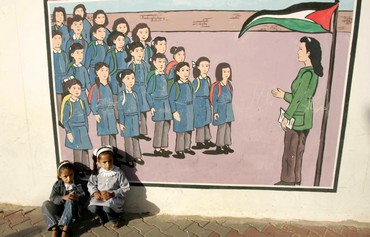Research and Translation: Dr. Arnon Groiss
(January 2016)
Produced as a joint endeavor of Lawfare, The Israel Legal Forum and the Center for Near East Policy Research.
Preface:
A representative of the US State Department met with our center in July, 2015 and assured our staff that the new Palestinian Authority school books, used by the PA and UNRWA schools, would be devoid of incitement and that the new texts would also conform to standards of peace education. Our center therefore hired a team to purchase and translate the new Palestinian Authority textbooks, to discern if the new school books published by the PA are devoid of incitement and conform with standards of peace education. Here are the results.
Introduction
Between the years 2000-2006 the PA introduced a new curriculum to be taught in all schools in the West Bank and Gaza, as well as in schools in East Jerusalem. Over 250 books for grades 1-12 in various subjects were published within a project partly financed by European countries. The books are continuously reprinted with some changes, but the fundamentals regarding Israel and the Jews have not been altered: delegitimization of both Israel and of the Jews’ very presence in the country, demonization of Israel and the Jews, non-advocacy of a peaceful solution to the conflict and, instead, emphasis on a violent struggle for the liberation of Palestine without limiting it to the areas of the West Bank and Gaza. Jihad, martyrdom and the so-called “Right of Return” are part and parcel of that violent struggle.
The following are examples taken from the newest versions available, which are identical to the content of the textbooks that were published in 2014 and 2015.
Delegitimization
- Israel’s establishment in 1948 by virtue of the 1947 UN Partition Resolution is considered “occupation”:
“The Israeli Occupation
A disaster fell upon Palestinian society in 1948 at the hands of the Zionist organizations as most of the Palestinians were forced to emigrate from their land and the State of Israel was established on part of Palestine…”
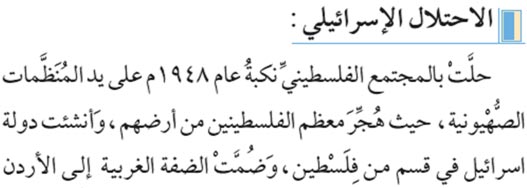
(National Education, Grade 5 (2014) p. 30)
- The country in its entirety is “Arab and Muslim”, as shown on the map:
“Lesson Four: Palestine is Arab and Muslim”
“The Palestinian people is part of the Arab-Muslim nation”
[The inscription next to the country says:] “Palestine”
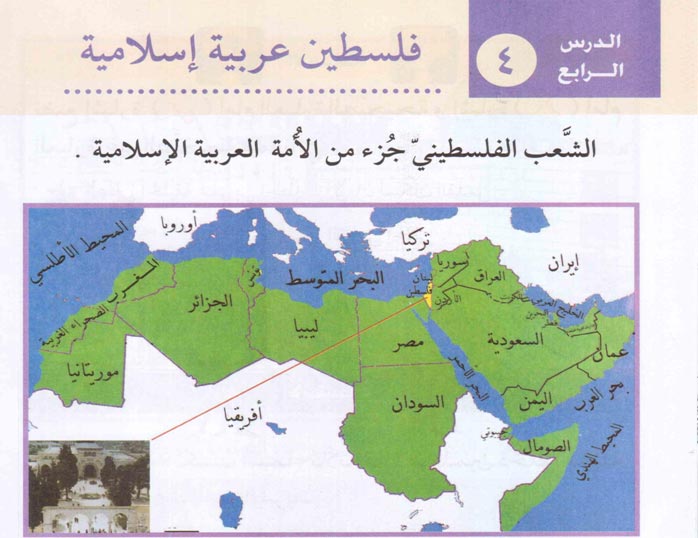
(National Education, Grade 2, Part 1 (2015) p. 16)
- Palestine replaces Israel in the region:
“I learn
The land of the Levant [Bilad al-Sham in Arabic] was so named because it is located to the north of the honorable Ka’bah. The land of the Levant presently comprises the following states: Palestine, Jordan, Lebanon and Syria.”
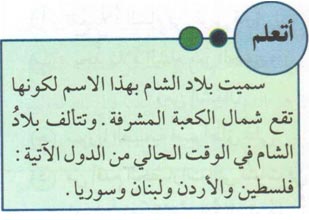
(History of the Ancient Civilizations, Grade 5 (2014) p. 27)
- The State of Palestine replaces Israel in the following illustration that accompanies a mathematics assignment:
“13. The independence of the State of Palestine was proclaimed in the year 1988 [in Algiers]. How many years have passed since the proclamation of independence?
The answer: …..”
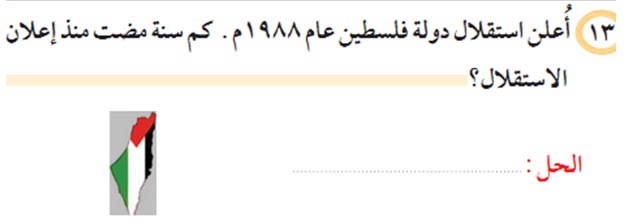
(Mathematics, Grade 3, Part 1 (2012) p. 80)
- Israel’s 6-million Jews are not counted among the inhabitants of the country, while Israel’s Arab citizens are (and note the use of the word “Interior” as an interlocution for Israeli territory):
“Activity 3
Let us examine the figures – the inhabitants of Palestine on 1.2.1999
Percentage
1) The [West] Bank 1,972,000}
2) [The] Gaza [Strip] 1,113,000} 36%
3) The Palestinians of the “Interior” [i.e., pre-67 Israel] 1,094,000 13%
4) The Palestinians of the Diaspora 4,419,000 51%
Total 8,598,000 100%”
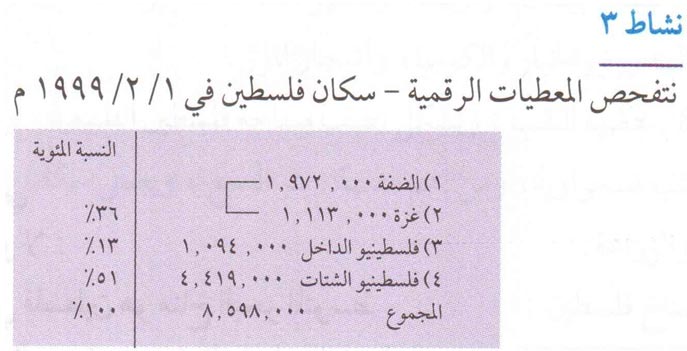
(National Education, Grade 6 (2014) p. 10)
Demonization and De-Humanization
- A poem demonizing the Israeli/Jewish person:
“How would you respond if an alien person attacked your family –
Having been dazzled by his weapon he bared a wolf’s fang
…
How would you respond if he claimed that the date palm grove
And the orange orchard and your Arab olive trees
And yourself, and your wife Salma and your decent sons
Are war spoils and seized possessions…”
…
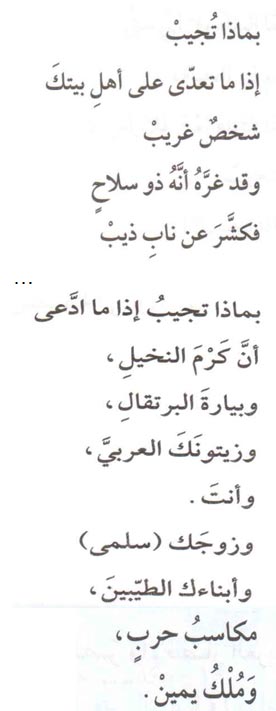
(Reading and Texts, Grade 9, Part 2 (2014) pp. 51-53)
- Jews/Israelis are described as invading snakes:

“By your life! How come that snakes invade us…”
(Arabic Language: Linguistic Studies, Grade 12 [Humanities & Sciences] (2015) p. 63)
- Killing of Jews is presented as a precondition of the End of Days:
“Fighting the Jews and the victory over them: The Messenger [Muhammad] already announced [the good news of] the end of the Jews’ oppression upon this Holy Land and the removal of their corruption and of their occupation thereof. [It is told] by Abu Hurayrah [one of Muhammad’s Companions] that the Prophet said: The End of Days will not take place until the Muslims fight the Jews, and the Muslims will kill them to a point that a Jew will hide behind a rock or a tree, and then the rock or the tree will say: ‘O Muslim, O God’s servant, there is a Jew behind me, so come and kill him’, except the salt bush, for it is one of the Jews’ trees”

(Faith, Grade 11 [Shar’i stream] (2013) p. 94)
Violent Struggle, Jihad, Martyrdom and the Right of Return rather than Peace
- Jihad in Palestine (the first verse of a poem):
“Lesson 11: Palestine By the poet Ali Mahmud Taha
O brother, the oppressors have exceeded all bounds and Jihad and sacrifice are necessary…”
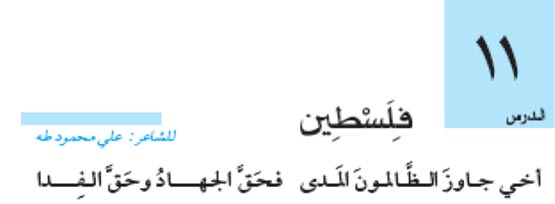
(Reading and Texts, Grade 8, Part 1 (2015) p. 44)
- The “Martyr” poem (excerpts – including a verse directly calling for martyrdom):
“The Martyr [Excerpts]
…
Hearing [weapons’] clash is pleasant to my ear
And the flow of blood gladdens my soul
As well as a body thrown upon the ground
Skirmished over by the desert predators
…
By your life! This is the death of men
And whoever asks for a noble death – this is it!”
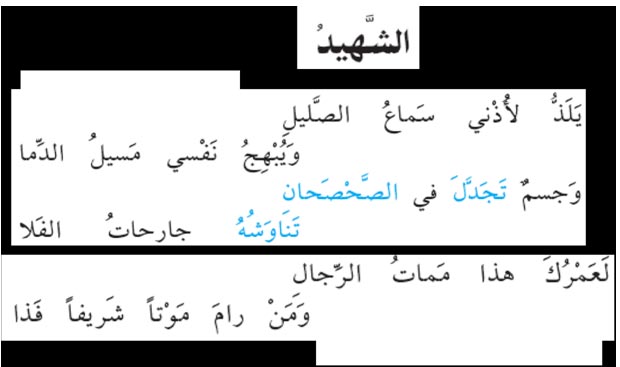
(Our Beautiful Language, Grade 7, Part 1 (2014) p. 75)
- Another poetical verse portrays martyrdom as a wedding party:
“O my homeland, I would not cry in this wedding party
For our Arab character refuses that we cry over the martyrs”

(Arabic Language: Linguistic Studies, Grade 12 [Humanities & Sciences] (2015) p. 8)
- The violent character of the presumed return of millions of the so-called refugees into present-day Israel:
“We Are Returning
Returning, returning, we are returning
Borders shall not exist, nor citadels and fortresses
Cry out, O those who have left:
We are returning
Returning to the homes, to the valleys, to the mountains
Under the flag of glory, Jihad and struggle
With blood, sacrifice, fraternity and loyalty
We are returning
Returning, O hills; returning, O heights
Returning to childhood; returning to youth
To Jihad in the hills, [to] harvest in the land
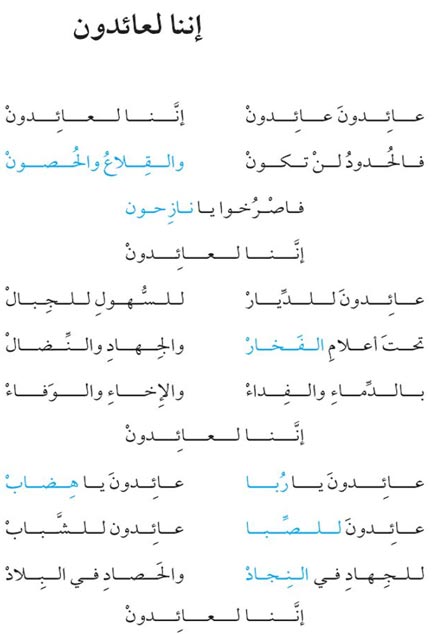
(Our Beautiful Language, Grade 5, Part 1 (2015) p. 50)
Conclusion
The foregoing examples speak for themselves. They clearly show that the PA does not educate Palestinian children for peace. Rather, the opposite is true.
Dr. Arnon Groiss – Professional background
Dr. Arnon Groiss is an Arabic-language journalist who has just retired from the Voice of Israel Arabic Radio after 42-year work there beginning in 1973. He is also an expert on Middle Eastern affairs having earned his Ph.D. degree from Princeton University’s Department of Near Eastern Studies, as well as an MPA degree from Harvard University’s Kennedy School of Government. Dr. Groiss taught for several years at the Hebrew University in the 1990s and 2000s. Between the years 2000-2010 Dr. Groiss served as chief researcher and, later, as Director of Research at the Institute for Monitoring Peace and Cultural Tolerance in School Education (IMPACT-SE, formerly known as the Center for Monitoring the Impact of Peace – CMIP), a non-political NGO committed to studying the attitude to the “other” and to peace in the Israeli and in other Middle Eastern curricula. During his work there Dr. Groiss studied hundreds of textbooks of various school subjects and authored over ten reports on Palestinian, Egyptian, Syrian, Saudi Arabian, Iranian and Tunisian schoolbooks. The reports are available on the Institute’s Web site http://www.impact-se.org. A summary of his ten-year research of this subject is to be found in “De-legitimization of Israel in Palestinian Authority Schoolbooks”, published in Israel Affairs, Vol. 18 (2012), Issue 3, pp. 455-484, where he compares the PA schoolbooks with other Arab and Middle Eastern ones, including their Israeli counterparts. Dr. Groiss has presented his findings since 2000 to both policy makers and people of the press on numerous occasions in various places, including the US Congress, the European Parliament, the UK House of Commons, the Israeli Knesset, the Canadian Parliament, the French Assemblée nationale and elsewhere. On the basis of his experience in this field, Dr. Groiss was appointed as a member of the Scientific Advisory Panel (SAP) of the Palestinian-Israeli Schoolbook Research Project commissioned by the Council of Religious Institutions of the Holy Land (CRIHL). The project was funded by the US State Department and ended in February 2013. Dr. Groiss’ evaluation paper of this research project is to be found at http://israelbehindthenews.com/library/pdfs/EVALUATIO1-1.pdf





